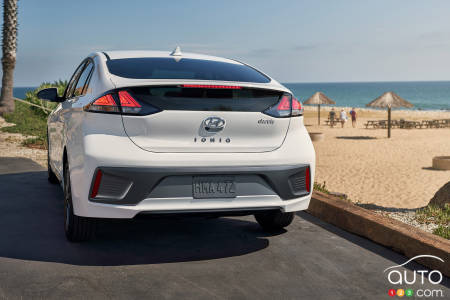Auto123 reviews the 2020 Hyundai Ioniq Electric.
What, you’d be forgiven for asking, is the Ioniq? Forgiven because this model has made itself quite discreet in its time on the market – especially, our market. And so, the Ioniq is one of the entry-level electrified models available under the Hyundai banner.
What makes it distinctive is that it is available in straight-hybrid, plug-in hybrid and all-electric versions, which come with starting prices of $25,399, $33,749 and $41,499, respectively. We had occasion to drive the last of these, which as it happens was freshly updated for 2020.
Let's face it: This electric Ioniq is not the most popular electric car on the market. And for good reason: it made its appearance in 2017 with only 200 km of range in a growing market that was welcoming models like Chevrolet's Bolt, which could travel 380 km on a charge and could be had for the same price. This Hyundai mid-size sedan had a hard time making a place for itself in the green vehicle market.
For 2020, Hyundai has refreshed the Ioniq and now offers a 38 kWh battery with an official range of 274 km. Admittedly, 274 km is very far from what Hyundai offers with the Kona or Kia's Niro/Soul cousins. However, the Ioniq Electric has the merit of being the cheapest electric car currently available on the market.
Discover Shopicar! All new makes and models and all current promotions.
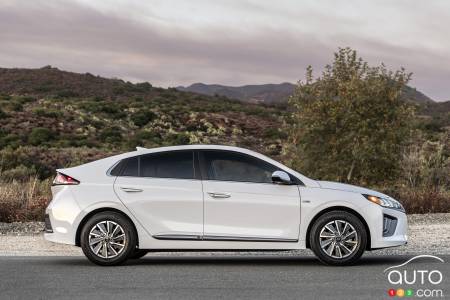
The exterior
At the front, there’s a large mesh grille with LED daytime running lights on both sides that give the vehicle a pretty appealing look. They are surmounted by LED lights that provide powerful and bright lighting at night.
At the rear, there’s a large, seriously sloping rear window, with a spoiler-like base that runs across the entire vehicle, topped by a second vertical window. This huge tailgate has the advantage of opening onto a large cargo area, but has the disadvantage, by its design, of impacting visibility when looking rear-ward, as the spoiler falls directly in the centre of the driver's field of vision.
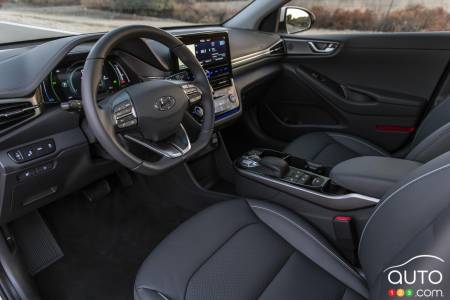
The interior
Once behind the wheel, it feels, for better or worse, like you're sitting in any compact vehicle like the Honda Civic, Mazda3 or Toyota Corolla. The interior space is functional and well-finished.
Our $45,899 Ultimate version, in addition to having all the safety features you'd expect, offers a 10.25-inch touchscreen (larger than the 8-inch screen in the entry-level versions) that's very easy to use and gives access to Apple CarPlay and Android Auto applications, as well as ambient lighting that illuminates the otherwise black and rather sombre interior of the Hyundai Ioniq Electric.
In addition to the heated front and rear seats, there's also a good-sized heated steering wheel with all the radio and cruise control functions on it. If two of you in the family are driving the vehicle, both can adjust their seat to their liking and keep it in memory. Let's not forget that these useful features are often expensive options from other manufacturers.
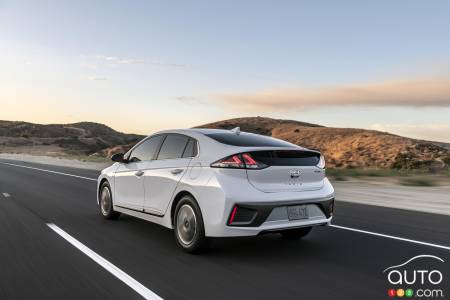
The powertrain
The Ioniq's electric motor delivers a total output of 134 hp, which is clearly insufficient and far below what the competition offers. To revive this car, you can choose between three driving modes: Normal, which is the default mode every time you start the vehicle, Sport mode, which shakes the Ioniq's electrons a little more, and Eco.
Concerning the Eco mode, the less said about it the better, actually. The vehicle already lacks power, but when this mode is chosen, it feels like a pedal car.
However, don't think that the Ioniq is an unpleasant car to drive, especially in the city. You quickly get used to the languid attitude of the powertrain and the comfort and functionality of the vehicle eventually make you forget about power issues.
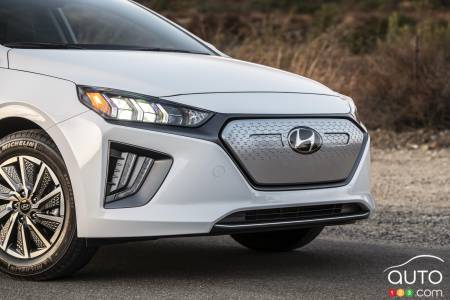
Range
As mentioned, the overall range is improved for 2020 with 274 km, mainly due to a revised electric drive train system. For everyday puttering about, the range of the electric Ioniq is more than sufficient. To recharge it, you can use Level 1, 2 and 3 stations. Which means, you can use 120v at home and wait for 36 hours, have a 240-volt terminal installed and wait about 6 hours, or use a 480-volt fast-charging terminal and fully recharge your Ioniq in 54 minutes.
Conclusion
No doubt about it, the electric Ioniq is certainly not the most exciting car to drive or the most technologically advanced. However, it does have a huge advantage: it is the most affordable model in the universe of electric vehicles. With a starting price of $41,499, it beats its direct rival the Nissan LEAF, which offers a 110Kw engine with a range similar to that of the Ioniq, but at a price of $46,360. The Chevrolet Bolt at $44,998 offers the best range at 417 km, but with a much smaller and less well-crafted interior than that of the Ioniq.
So, if you have a limited budget and are looking for a predominantly urban vehicle that allows you to make the most of federal and provincial government subsidies (in Quebec and British Columbia), the Ioniq is your best bet. It will take you from point A to point B in comfort and silence and without using a drop of gas.
In fact, one of our acquaintances had bought the Ioniq Electric and when we asked him why he chose it and not another, he replied simply, “it's the one that gives me the most for my money”!
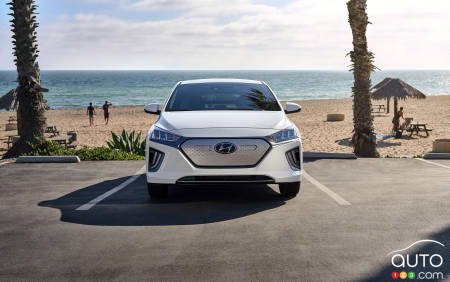
We like
Great value for an EV
Interior space
On-board security system
Comfortable vehicle to drive
We like less
Rear visibility
Uncomfortable rear seat
Lack of power
Range
The competition
Chevrolet Bolt
Hyundai Kona Electric
Kia Niro EV
Kia Soul EV
Nissan LEAF
Volkswagen e-Golf
Tesla Model 3
